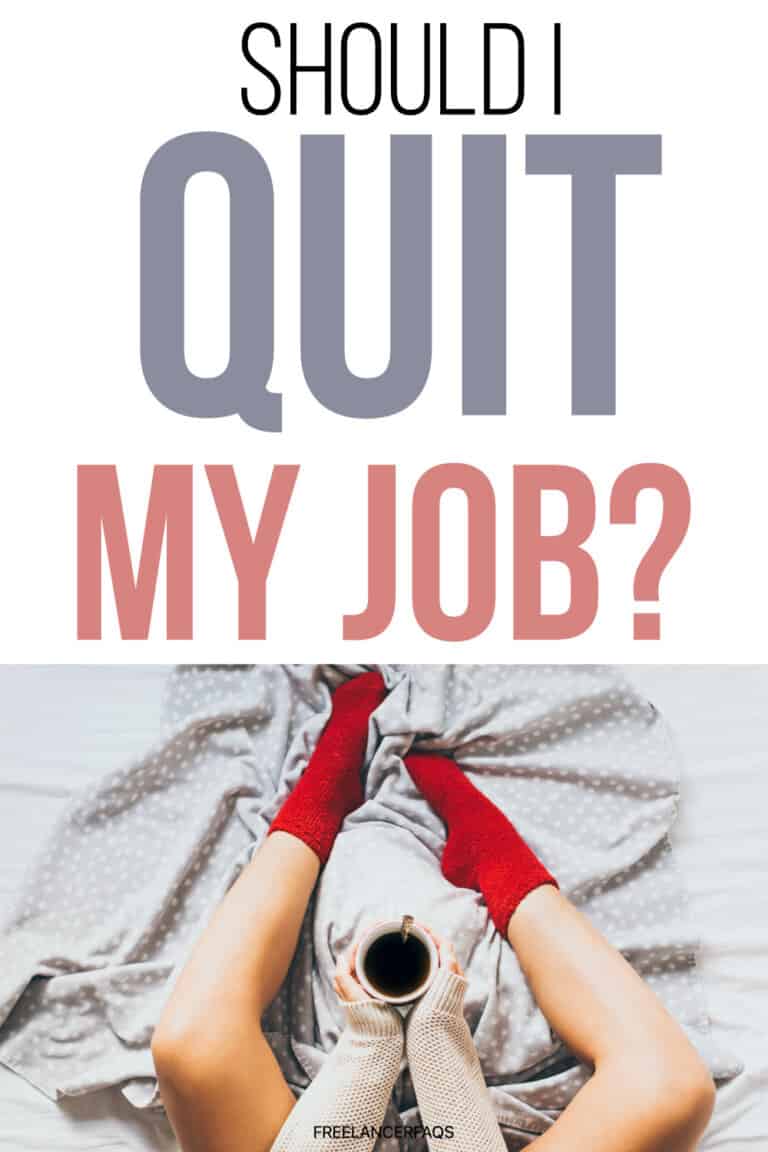It seems that nowadays the “go to work, get paid” formula simply isn’t cutting it for a lot of people.
With so many options out there – working from home, being self-employed, the gig economy, etc. – many employees are not as hesitant to walk away from a job if it’s not satisfying and meeting their needs.

It seems that nowadays the “go to work, get paid” formula simply isn’t cutting it for a lot of people.
But how do you know when to call it quits?
How much longer do you stick around before things get better or you burn out?
If you’re wondering if you should quit your job, here are some ways to tell it’s over – plus what to do when you finally make that decision!
How to Tell It’s Time to Quit Your Job

1. You Don’t Feel Passionate About Your Work
You get a greater sense of purpose and fulfillment when you are passionate about your work. This is why I talk a lot about passion when it comes to having a blog and choosing your niche. If you’re going to put your time and effort into it, it’s worth loving what you do.
Being passionate about your work increases your productivity and happiness – and you sometimes don’t even feel like you’re working at all!
Without passion, work can feel monotonous and like a waste of time. If you’re not excited about your work, it could be time to move on.
2. Your Skills Are Underused and Undervalued
A job shouldn’t be challenging to the point of being stressful but when your skills are underused and undervalued, your growth potential is limited and you may slip into a state of boredom.
When you’re not flexing your skills at home, it’s easy to become complacent and frustrated.
You may start to feel that you are not valued by your employer.
3. You Work in a Negative/Unhealthy Environment
The number one reason why many people ask, “Should I quit my job?” is because they work in a toxic environment.
Even if you are passionate about your job, a negative and unhealthy environment can easily squash it.
Something like hating your boss can really make you have a negative outlook with your job.
An unhealthy work environment can negatively impact both your professional and personal happiness as well as physical and mental health.
If you find yourself dealing with complaining coworkers, clique-behavior, and bullying, it’s probably time to think about quitting.
4. You’re Not Paid Enough
When it comes to getting paid for your work, there’s a lot of balancing between pay, job opportunities, and fringe benefits. However, if you are being significantly underpaid, this represents a discrepancy between what you and your employers believe your value to be.
Most often, people feel overworked and underpaid.
Over time, this will lead to frustration and resentment. If you feel this way, now is the time to start looking for a job that will compensate you based on your experience and worth.
5. Your Work is Taking Over Your Life
“Work-Life Balance” is a huge buzz term nowadays and this is because many people are finding it hard to separate their work life from their personal life.
Having a strong work ethic doesn’t mean overstepping your personal boundaries to placate your employers.
If you find yourself working constantly or unable to leave your job at the door, it may be time to quit your job.
Not having a healthy work-life balance can affect your health and well-being as well as your productivity and work quality.
6. You’re Overwhelmed at Your Job
Work can be stressful but there is a line between being stressed out because of a particular situation or being in a constant state of overwhelm.
Overwhelm will eventually lead to full-on burnout.
If you find that you are constantly having projects piled on top of you with no support from your team, your job is going to feel more burdensome than enjoyable. If no one is willing to help you lighten your load, it may be time to go.
7. You Complain About Your Job…A Lot
We all have issues with our jobs that we need to unload onto a friend from time to time.
However, if you find yourself complaining about your job on a regular basis – especially if you are complaining about the same issues over and over and nothing is changing – it may be time to consider leaving.
8. There’s No Room for Advancement
Most of us start jobs with the goal of gaining experience and progressing our careers.
When you spend your time and energy at a job and get nowhere, you begin to feel stagnant and restless.
Remember that opportunities for growth are not limited to promotions but can also include working on new projects and begin taught new skills.
If you’re not being offered these types of opportunities, it could hinder your career growth – so it’s time to move on.
9. The Thought Of Going to Work Makes You Feel Sick/Depressed
When you go to sleep every night dreading the next day of work or feeling deeply sad that the weekend is over, it could be that your job is causing you to feel depressed and anxious.
While most of us “hate” going to work, it’s more so that we would rather not get out of our pajamas and go be adults.
However, if the thought of work is making you feel sick or you’re losing sleep over it, it’s time to ask yourself: “Should I quit my job?”
Work won’t always be fun and fulfilling but you should at least feel comfortable there – or feel okay once you walk in the door. You spend a lot of time there and you’re spending your precious time off dreading it, it will start to affect your physical and mental health.
10. You Hate Your Job
Sometimes, when it comes down to it, you should quit your job because you hate your job.
Who wants to spend the majority of their day doing something they despise?
There are so many opportunities out there to do something that you love!
I Want to Quit My Job: Now What?

Before you pull the plug on your new job and start nuking bridges, it’s important to both approach your resignation properly and ensure you are ready to take on your next venture!
There are two reasons why you should leave your job professionally with proper notice:
- You’ll want a good reference when you apply for a new job.
- Unforeseen circumstances may lead you back to your old job.
Aside from the leaving part, you’ll want to make sure you have something to move on to.
While you’re asking yourself, “Should I quit my job?” you need to be also preparing for your future endeavor.
You’re on a site for freelancers, so it goes without saying that I am going to suggest looking into starting a side hustle before you quit your job.
Specifically, you should consider starting and growing a side hustle in the gig economy.
In the United States, over 50 million Americans earn their main income from working in the gig economy – and by 2027 that number is expected to jump to 86.5 million!
And 75.7% of gig workers would not quit their gigs for a full-time job.
So what is the gig economy?
“Gig economy” refers to when freelance workers get paid for the job done. They don’t clock in or, have lunch breaks, vacations, benefits, etc.
Technically, a gig worker is their own employer and they are “contracted” by clients to complete a specific task.
There are three participants when it comes to the gig economy:
- The client: This is the person/company who is requesting the goods or services.
- The platform: This is the website/app/etc. that connects the client with the worker (optional).
- The gig worker: The gig worker is the person providing the goods or services.
So, in a nutshell, gig economy jobs are typically temporary job positions with organizations that hire independent workers to undertake short-term tasks. However, even short-term tasks can turn into a full-time income!
How to Earn a Living in the Gig Economy

There are three major benefits to getting involved in the gig economy.
First, you don’t always need tons of experience or education to get started.
Secondly, you can set your schedule around the times that work for you.
For instance, to become an Uber driver you only need to own a car with the proper insurances.
You don’t need to go through any certification processes and you can set your schedule to work around your life or when you can make the most money (such as during morning and evening rush hours).
Lastly, gig economy work pays well. A report from CNBC found that freelancers generally make at least $50 an hour!
However, succeeding in the gig economy and earning a living depends on how much you work.
You also have to consider the fact that you will be solely responsible for your finances, taxes, and health benefits.
With enough passion, a good work ethic, and the right skills, you can definitely earn a living by working gigs!
Plus, as I said, one-shot jobs can become full-time work if you develop a good relationship with your client.
20 Gig Economy Jobs You Should Check Out

If you’re interested in exploring the opportunities in the gig economy before deciding if you should quit your job, here are some ideas to get you started:
Delivery Gigs
From Amazon to your favorite restaurant to your local grocery store, you can order just about anything online!
Many of these items cannot be delivered through regular mail (especially a Big Mac), so independent drivers are hired to make the deliveries.
- DoorDash
- PostMates
- UberEats
- Skip the Dishes
- Instacart
Driving Gigs
Getting around without a vehicle no longer requires you to call a cab. If you have a reliable car, you can offer your services as a driver!
- Uber
- Lyft
- Ridesharing
- Elder Transit
Service Gigs
Have a service you can offer? This is part of the gig economy too! All you need to do is build up a clientele and set your own schedule.
- Babysitting
- Petsitting
- Dog Walking
- Photography
- Catering
Online Gigs
 I could go on and on about making money through online gigs, but here’s a sampling of some at-home gigs:
I could go on and on about making money through online gigs, but here’s a sampling of some at-home gigs:
- Freelancing
- Affiliate Marketing
- Tutoring/Teach
- Logo Design
- Edit/Proofread
- Dropshipping
What Will You Do?
If you’ve come to the conclusion that it’s time to bid your job adieu, make sure you take time to consider your next move first.
Becoming successful in the gig economy can take some time but, if you start now, you can more easily transition from your current job into a position where you can earn good money while following your passions.
What about you? Have you been thinking of quitting your job and getting into the gig economy?
Tell me about it in the comments!




Leave a Reply